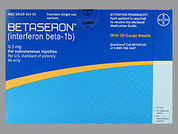Betaseron
Interferon Beta-1B
What is Betaseron used for?
This medication is used to treat multiple sclerosis (MS). Interferon is not a cure for MS, but it may help to slow disease worsening and decrease flare-ups of symptoms (such as balance problems, numbness, or weakness).
CHEMICAL NAME
DRUG TYPE
Multiple SclerosisBetaseron Prices
Searching for the lowest prices
Betaseron Frequently Asked Questions
Read the Medication Guide and Instructions for Use provided by your pharmacist before you start using this medication and each time you get a refill. Ask your health care professional how to prepare and use this medication. If you have any questions, ask your doctor or pharmacist.
Inject this medication under the skin as directed by your doctor, usually every other day. The injection is given in the thigh, abdomen, buttock, or the back of the upper arm. It is best to use this medication near bedtime to reduce side effects. The dosage is based on your medical condition and response to treatment. To reduce your risk of side effects, your doctor may direct you to start this medication at a low dose and gradually increase your dose. Follow your doctor's instructions carefully.
Before using, check this product for particles or discoloration. If either is present, do not use the liquid. Before injecting each dose, clean the skin you are going to inject into (the injection site) with rubbing alcohol. Change the injection site each time to lessen injury under the skin. Do not inject into skin that is red, sore, scarred, or infected. Tell your doctor of any skin reactions that do not go away after a few days. To lessen bruising, do not rub the injection site after a shot. Learn how to store and discard medical supplies safely.
Use this medication regularly to get the most benefit from it. To help you remember, use it at the same time for each scheduled dose.
Tell your doctor if your condition gets worse.
IMPORTANT: HOW TO USE THIS INFORMATION: This is a summary and does NOT have all possible information about this product. This information does not assure that this product is safe, effective, or appropriate for you. This information is not individual medical advice and does not substitute for the advice of your health care professional. Always ask your health care professional for complete information about this product and your specific health needs.
